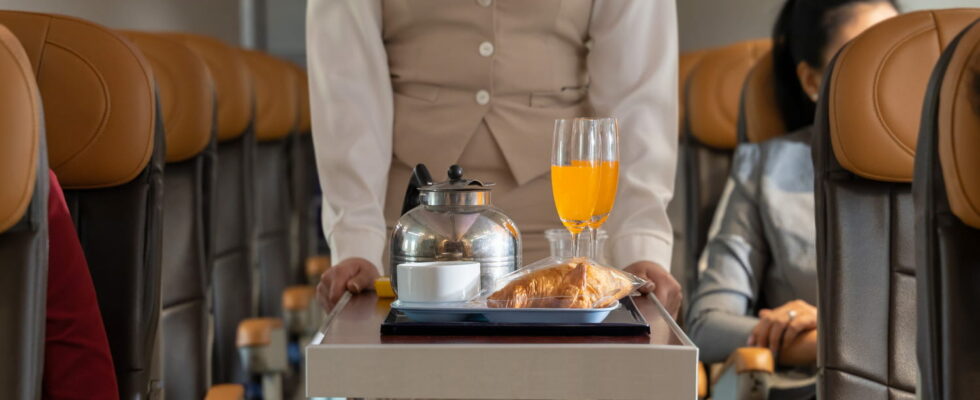It’s not always a good idea to drink on a plane ride.
The time can sometimes seem long on a plane. We eat, we sleep a little, we watch a film… And when the hostess comes by to ask if we want to drink something, we accept to keep ourselves busy more often than out of real thirst. Be careful with the drink you choose because there is one that is particularly bad when you take a plane, according to observations by German researchers reported in the journal “Thorax”.
Soda, sparkling water, tomato juice, coffee, tea, glass of wine or even a glass of Champagne? Airlines offer a variety of in-flight drinks. The scientists were interested here in the effects of alcohol on the sleep and heart rate of 40 subjects. They asked these healthy individuals to spend two nights of 4 hours of sleep (from midnight to 4 a.m.) either in a sleep laboratory or in an altitude chamber (mimicking the effects of flying). . Some participants drank alcohol before one of the two nights and then the sample was reversed. Several data were recorded while they slept, including their heart rate and their blood oxygen saturation, also called SpO2. The latter gives an estimate of the quantity of oxygen transported by red blood cells from the lungs to the rest of the body.
At the end of the analysis, the researchers observed that the subjects who drank alcohol and slept at altitude saw their oxygen saturation drop to around 85%, their heart rate increase to around 88 beats per minute (between 50 and 80 times per minute normally) and had about 46 minutes of deep sleep. In comparison, patients who slept in the sleep lab without drinking alcohol had an oxygen saturation of about 96 percent, a lower heart rate of about 64 beats per minute, and deep sleep of about 68 minutes.
For researchers “the combination of alcohol and in-flight hypobaric hypoxia (drop in air pressure due to altitude which causes the body to receive less oxygen) reduced sleep quality, strained the cardiovascular system and led to a prolonged duration of hypoxemia (low blood oxygen level)“. According to their observations “Even in healthy individuals, the combination of alcohol consumption and sleeping in hypobaric conditions places considerable strain on the cardiac system and could lead to an exacerbation of symptoms in patients with heart and lung disorders.”. The higher the alcohol consumption, the greater these effects could be, particularly among older passengers and those with pre-existing health conditions. “Practitioners, passengers and crew should be informed of the potential risks, and it may be beneficial to consider changing regulations to restrict access to alcoholic beverages on aircraft” they concluded.
